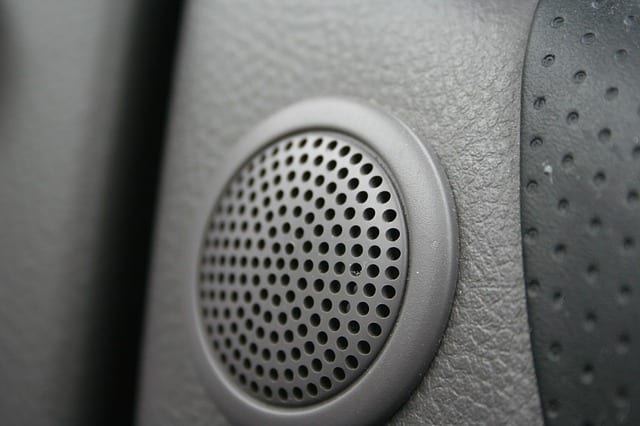The kind of speakers choose for your car audio system will largely determine the overall music experience you’ll get. You may have installed the best car amplifier and stereo receiver, but without good car speakers, you won’t enjoy the best sound. Thus, it’s important to choose new car speakers carefully. When shopping for new car speakers, there’re certain important considerations to make. Here’re the most important factors to consider.
- Speaker Size
Car speakers are available in different sizes. Larger speakers can move more air for louder sound. If you need more bass, a larger speaker will be your best choice since the woofer driver needs to move a lot of air to reproduce louder and deeper bass. However, larger speakers take up more space in the car. Thus, larger speakers are ideal for installation where space is sufficient.
On the other hand, smaller speakers are ideal for installation in a car with limited space. For instance, 4-inch car speakers are small enough for installation in about any car regardless of the available space. Also, smaller speakers are often more affordable than larger speakers.
- Type of Speakers
You can choose between two different types of car speakers including full-range speakers and component speakers. Each type has its advantages and disadvantages. It’s important to learn more about these two types of speakers.
Full-Range Speakers
Full-range speakers are also known as coaxial speakers. They comprise of a woofer, midrange, and a tweeter all built-in one speaker basket. They’re known as full-range since they’re able to reproduce all sound frequencies. The woofer driver reproduces low frequencies whereas the midrange driver reproduces mid frequencies. On the other hand, the tweeter reproduces high frequencies. Some full-range speakers also come with a super tweeter as an extra driver for reproducing higher frequencies that a regular tweeter may not reproduce. Also, full-range speakers often come with an inbuilt crossover.
One of the benefits of full-range speakers is that they’re easier to install than component speakers. This is because they come as a full-range speaker system built in a single basket. Their ease of installation makes them ideal for DIY installation. Besides, they’re more affordable than component speakers. Thus, if you’re working with a tight budget, a full-range speaker would be your best choice. However, full-range speakers are not the best option for a custom sound experience.
Component Speakers
Component speakers are another type of car speakers. They’re designed as a single driver system. Typically, a component speaker system includes a separate woofer, a separate mid-range driver, and a separate tweeter. Also, a component speaker system requires a standalone crossover.
The main benefit of a component speaker system is that you can mount each driver in the location that offers the best sound imaging. Thus, a high-quality component speaker system can offer better sound quality than full-range speakers. Also, component speakers allow for sound customization. However, a component speaker system is often more expensive and more challenging to install than full-range speakers.
- Power Handling
Power handling is another important factor to consider. Power handling is the amount of power that a speaker can handle safely from the receiver or amplifier. Every car speaker comes with a certain power handling rating. Power handling is rated in terms of RMS power and peak power. When choosing a speaker, the RMS power rating should be considered more than the peak power rating. The RMS power rating indicates the continuous amount of power that a speaker can handle whereas peak power indicates the power that a speaker can handle in short power bursts.
When buying new speakers for your car, ensure their power handling matches the power output of the receiver or amplifier. Ideally, the speakers you choose should have a power rating that the amplifier can feed sufficiently. For instance, if the speakers are too powerful for your car amplifier, you won’t get the best sound experience.
- Speaker Sensitivity
The sensitivity of a speaker is the amount of sound that a speaker reproduces from the power it receives. Ideally, a speaker with a low sensitivity rating will require more power to produce sound whereas a speaker with a high sensitivity rating will require less power to produce sound.
If you’re using a factory car receiver, then consider choosing speakers with a high sensitivity rating since factory receivers are often weak. On the other hand, if you’re using a powerful amplifier, you can comfortably use a speaker with a lower sensitivity rating.
- Build Quality
It’s important to consider the quality of the speakers you’re choosing. Speakers with a good build quality will deliver better sound quality and are more durable than those with poor built quality. In this case, ensure all the speaker components are made with premium quality materials.
Conclusion
Although your ultimate choice will be based on your personal preferences, it’s important to keep the above-mentioned tips in mind to stand higher chances of choosing the best car speakers. Although your budget will also determine the choices you’ll make, don’t compromise quality over cost. By choosing the right speakers for your car, you’ll have an enjoyable car music system.
References
https://www.crutchfield.com/S-ag8nHLtvX2S/learn/learningcenter/car/speakers.html
https://www.bestcaraudio.com/choosing-car-audio-speakers/
https://www.lifewire.com/choosing-the-best-new-car-speakers-534576
https://knowtechie.com/car-speakers-buying-guide/
https://caraudiologic.com/car-speakers-guide/
https://liarsliarsliars.com/car-audio/what-to-look-for-when-buying-speakers-for-your-car/
http://crystalstereo.com/how-to-choose-the-best-car-speakers/







